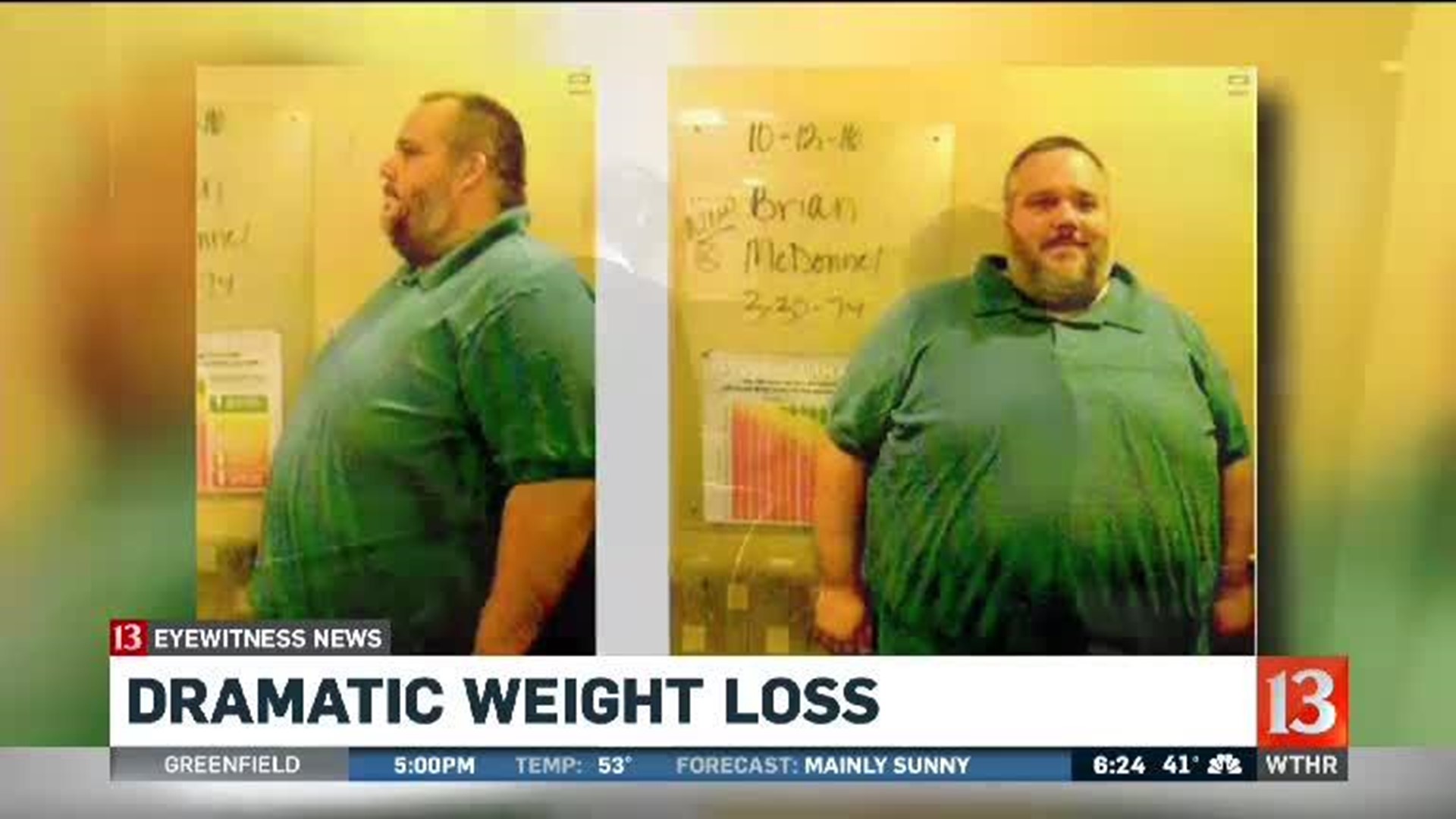MUNCIE, Ind. (WTHR) — Many of us are carrying more weight than we'd like.
In Indiana, 32.5 percent of residents are obese. As that rate steadily climbed over the last twenty years, Indiana is now ranked the tenth-most obese state in the country.
Brian McDonnel knows what it's like. At his highest weight, he was 543 pounds.
"I take full ownership of where I was at. I love food, I ate way too much and it's all me, it's nobody’s fault but my own," McDonnel said.
He has lost significant weight five times in his life and he is hoping this most recent loss is the one that lasts.
"There's morbid obesity, then there's my uber-over obesity where I was at and something had to change," McDonnel said.
And what a change.
McDonnel lost 375 pounds over the last two years. He now weighs 165 pounds and is working to add some muscle weight.
Even those who know the 44-year-old don't recognize him.
"We had a retreat last weekend where a former boss of mine had no idea who I was," McDonnel said.
McDonnel has lost significant weight before, dating back to 1990.
Since then he's lost 85, 130, 270 and 200 pounds but each time he would gain the weight back, and then some.
His latest attempt started, in part, with an injury.
"I ended up with a meniscus tear in my knee and there was a true risk that I would not be able to fit into the MRI machine and I was really worried. What if I break the MRI table?" McDonnel said.
That fear, plus productive conversations with a new general practitioner, caused McDonnel to consider surgical options at IU Health Bariatric and Medical Weight Loss.
"I never wanted to have surgery because I thought, 'well that's an easy way out.'" McDonnel said.
He went to see Dr. Ambar Banerjee in Carmel, who says few patients opt for surgery.
"You would expect, based on the health of the population in this country that it's going to be very, very popular and more patients would be seeking bariatric surgery, but that's not the case. Despite the obesity pandemic, it's everywhere, but only about 1 to 2 percent of the morbidly obese patients seek bariatric surgery, so that's a very low number compared to what you'd expect. In bariatric, the initiative comes from the patient because you have to realize there is a problem and then seek help," Banerjee said.
At McDonnel's first appointment, his body mass index (BMI) was in the low 80's.
"The first discussion that I had with him was that he's going to be a high-risk candidate because of his extreme BMI. A BMI of 30 is considered obese. I've seen a few, but Brian and patients like him are in the minority in the bariatric world," Banerjee said.
McDonnel says he got there eating 7,000 to 10,000 calories a day.
"I ate a lot of pizzas, I ate a lot of fast-food, I liked desserts. I know they throw at people 'are you a big carbaholic or are you a big meat and potatoes' and my answer is yes to that, I like all of it," McDonnel said.
Banerjee recommended the Roux-en-Y gastric bypass surgery.
"The Roux-en-Y is considered the gold standard of bariatric surgery. It used to be the most popular surgery. Now in the last couple of years, sleeve gastrectomy has become the most popular in this country," Banerjee said.
But Banerjee told McDonnel for the best outcome, he would have to lose weight before surgery and get his BMI down to a 50. McDonnel responded and lost 210 pounds in just seven months. Banerjee called his response to his pre-surgery challenge "rare."
"Very, very rare. He's probably one of the very few patients, under five, I would say, who has lost incredible weight just to prepare for surgery," Banerjee said.
The surgery changed McDonnel's anatomy. His stomach is reduced size of an egg and part of his intestine is re-routed, causing less absorption of nutrients.
Now McDonnel eats small meals that need to be nutrient-dense. He packs and prepares his meals each day with a goal of not exceeding 2,800 calories per day.
He also is working out six days a week for two-and-a-half hours a day. He mixes cardio and weights in his early morning workouts before work as a hospital administrator.
In the 10 months post-surgery, McDonnel lost another 165 pounds.
His pants, which were a 68, are now a 33 waist. He wears a large shirt instead of a 7X. He can step his entire body into one of his old pant legs.
Banerjee says McDonnel's weight loss is one of the most dramatic he's seen in his career.
"It's extremely gratifying and that is the reason I perform bariatric surgery. I think this is a field where you can transform a life," Banerjee said.
McDonnel likes the structure of his new diet and exercise routine. He feels mentally, physically and emotionally stronger. His sleep apnea is gone. He hopes with this medical approach and accountability, he will be able to keep the weight off for good.
"You might be able to do it on your own, but this is an option for you and we need to understand that you're trying to improve yourself and there may be a stigma, but there shouldn't be. You should be proud and own the position you're in and own the solution too. It's a lot of work and you have to stay on top of it, but the science is solid, you follow the rules, and you can succeed."

